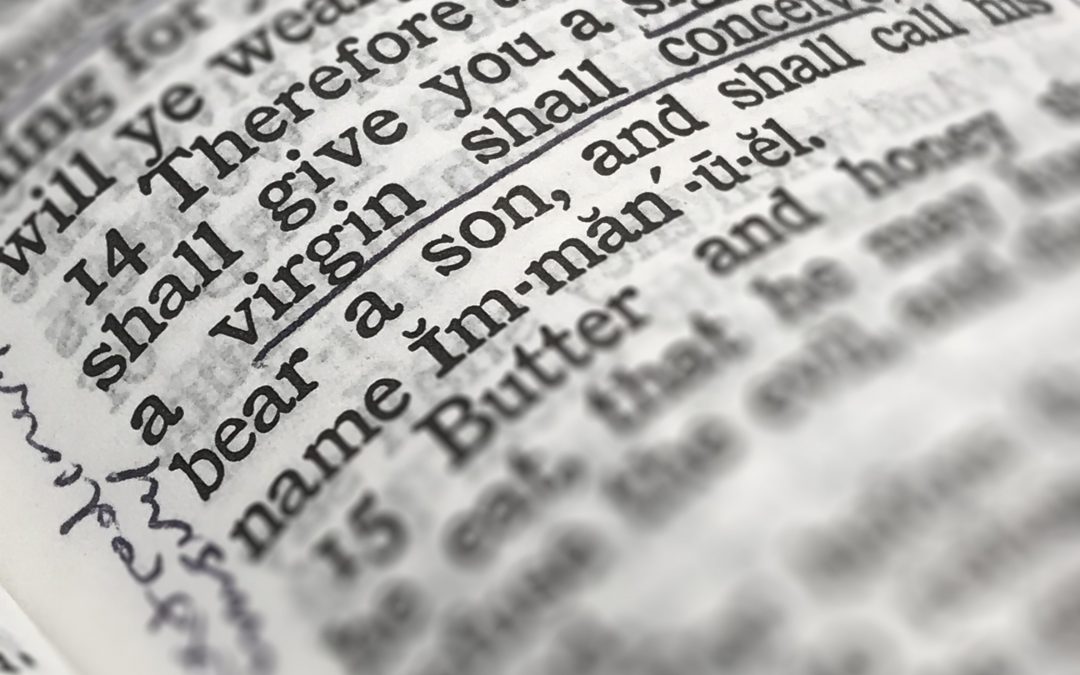Response by Ken Symes |
Today, the Jewish rabbis, along with many Christian leaders, do not believe that Isaiah 7:14 teaches that the Messiah was to be “virgin” born.
“Therefore the Lord himself shall give you a sign; Behold, a virgin [almah] shall conceive, and bear a son, and shall call his name Immanuel.”
As the Bible is of no private interpretation, 2 Peter 1:20, it follows that the Bible interprets itself. The process is simple. You compare all the scriptures related to a given issue and you will discover that you have found God’s truth when all of those scriptures harmonize. In the case before us, the conflict revolves around two issues: the meaning of the Hebrew word “almah,” and to whom the sign was to be given.
VIRGIN
According to the rabbis, the Hebrew word translated “virgin” in our text always means “young woman of marriageable age.” This particular word is used only seven times in the Tenach (Old Testament): Genesis 24:43; Exodus 2:8; Psalm 68:25; Song of Solomon 1:3 and 6:8; Proverbs 30:19 and Isaiah 7:14. It is never used of a non-virgin! Furthermore, in Isaiah 7:14, the Hebrew has the definite article “ha,” “the,” before “almah.” The Hebrew word “ha” tells us that this is a specific person: “the” virgin.
A second word is sometimes translated “virgin,” but does not necessarily mean “virgin” as the modern rabbis would have us believe. “Bethulah” is used some 50 times in the Tenach and there are times when this word, often translated virgin(s), needs clarification. And in Joel 1:8 bethulah is used of a married woman: “Lament like a virgin [bethulah] girded with sackcloth for the husband of her youth.”
In Genesis 24:16 Rebekah is described as bethulah: “And the damsel was very fair to look upon, a virgin [bethulah], neither had any man known her: and she went down to the well, and filled her pitcher, and came up.”
Notice that “bethulah” is qualified to indicate it means virgin – neither had any man known her. But, in verse 43 of the same chapter, in the retelling of the event by the servant in the home of Rebekah’s brother Laban, she is described as “almah”: “Behold, I stand by the well of water; and it shall come to pass, that when the virgin [almah] cometh forth to draw water, and I say to her, Give me, I pray thee, a little water of thy pitcher to drink.”
Why? Not one of the times the word “almah” is used does it mean anything other than a virgin. Clearly, “bethulah” and “almah” can be used interchangeably, as they are in Genesis 24. It is interesting that Rashi (1040-1105 A.D.) wrote, “Behold the almah shall conceive and bare a son and shall call his name Immanuel. This means that our Creator shall be with us. And this is the sign: the one who shall conceive is a girl (naarah), who never in her life has had intercourse with any man. Upon this shall the Holy Spirit have power.” (Mikraoth Gedoloth on Isaiah 7:14).
The Septuagint (Greek translation of the Hebrew text around 275 B.C.) translated the verse: “Behold a virgin shall conceive in the womb, and shall bring forth a son, and thou shalt call his name Immanuel.”
“This is Messiah,” says Rabbi Hona (Zohar, in Gen. Fol. -3,4, written about 1306 A.D.). Bible believing Christians are in agreement with the ancient rabbis. “Almah” is correctly translated “virgin” in Isaiah 7:14.
THE SIGN
In Isaiah 7:10-12, God, through His prophet, said to Ahaz: “Ask thee a sign of the LORD thy God.” In verse 12, Ahaz refused to ask, using Deuteronomy 6:16 as his excuse, showing that he already had made up his mind to trust in Assyria. At this point, the Lord redirects to whom the sign would be given. He now makes “the house of David,” not Ahaz, the recipient. Notice that the antecedent of “you” in verse 14 is the “house of David” in the previous verse. The Hebrew term, “lakem,” translated “to you” is in the plural form and designates: “given to you but fulfilled later.”
The sign would involve an unusual birth, a “virgin” birth (verse 14b). The rabbis, for a long time, have sought to teach that this sign would be the birth of Hezekiah, the son of Ahaz. But, that could not possibly be true. In 2nd Kings 18:2 we learn that Hezekiah was twenty-five years old when he began to reign. Which was in the third year of the reign of Hoshea as King of Samaria. 2nd Kings 17:1 states: “In the twelfth year of Ahaz king of Judea began Hoshea the son of Elah to reign in Samaria over Israel nine years.”
It is historically accepted that the third year of Hoshea’s reign is 729 B.C. Hezekiah is 25 at this time, which makes his birth year 754 B.C. Most Bible chronologies place Ahaz’ reign begining at 743-44 B.C., and the events of Isaiah 7 at 740 B.C. Hezekiah was already alive, and probably 14 years old, based on these dates. As the sign is an unusual birth, a child born of a virgin, the child could not possibly be Hezekiah.
An examination of Isaiah 7:14, and the word “almah,” shows the word is translated correctly in all versions that translate “almah” as “virgin.” The virgin shall conceive was fulfilled through Mary, the mother of Jesus, Matthew 1:18-23.

